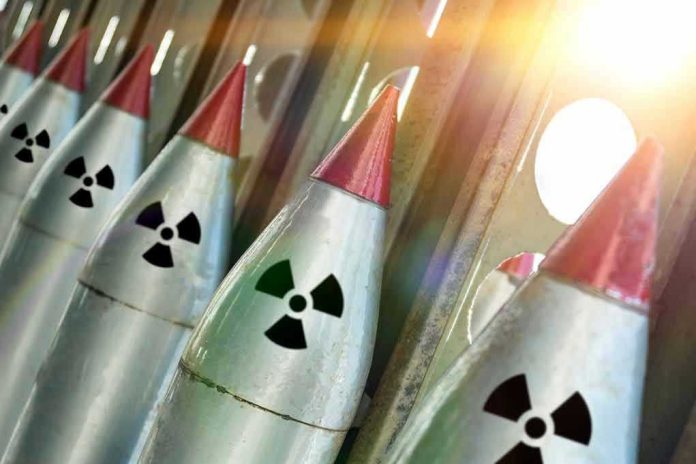
President Trump has shattered decades of nuclear restraint by ordering the Pentagon to immediately resume nuclear weapons testing, ending America’s 33-year moratorium and potentially triggering a new global arms race.
Story Highlights
- Trump directs Pentagon to begin nuclear weapons testing “immediately” to match other nations
- Decision ends U.S. nuclear testing moratorium maintained since 1992
- Announcement made via Truth Social ahead of meeting with Chinese President Xi Jinping
- Move justified by citing Russian and Chinese nuclear programs, despite no recent detonations by either
Trump Breaks Three-Decade Nuclear Testing Pause
President Donald Trump announced Thursday on Truth Social that he has instructed the Pentagon to restart nuclear weapons testing after a 33-year hiatus. The directive marks the first presidential order to resume nuclear testing since 1992, when the United States last conducted such operations. Trump’s statement declared, “Because of other countries testing programs, I have instructed the Pentagon to start testing our Nuclear Weapons on an equal basis. That process will begin immediately.” The announcement came just before his scheduled meeting with Chinese President Xi Jinping at the Asia-Pacific Economic Cooperation summit in South Korea.
Justification Based on Foreign Nuclear Activities
The president cited ongoing nuclear programs by Russia and China as primary justification for ending America’s testing moratorium. Trump specifically referenced Russia’s reported October 21 test of its nuclear-powered Burevestnik cruise missile as evidence of foreign advancement requiring U.S. response. However, international monitoring data from the Associated Press and United Nations contradicts claims of recent nuclear detonations by either Russia or China. Both nations, along with the United States, have maintained de facto moratoriums on nuclear explosive testing since the 1990s, despite remaining unsigned to the Comprehensive Nuclear-Test-Ban Treaty ratification.
Pentagon Faces Immediate Implementation Challenge
The Defense Department now confronts the complex task of operationalizing Trump’s directive without clear guidance on scope, timeline, or location. The ongoing government shutdown has limited official White House responses and detailed explanations of implementation plans. Pentagon officials must determine whether to revive the Nevada Test Site, last used in 1992, or establish new testing facilities. The directive raises questions about environmental impact assessments, personnel safety protocols, and coordination with nuclear weapons laboratories that have relied on computer modeling rather than live testing for three decades.
Arms control experts warn that resuming nuclear testing could destabilize global security arrangements and encourage other nations to abandon their own testing moratoriums. The move potentially undermines international nonproliferation efforts and the Comprehensive Nuclear-Test-Ban Treaty framework, even though major powers have not ratified the agreement. Only North Korea has conducted nuclear tests in the 21st century, performing six detonations between 2006 and 2017, making it the sole violator of the global testing pause.
Strategic Implications for American Security
Trump’s decision represents a fundamental shift in U.S. nuclear doctrine and international relations strategy. The policy change occurs amid heightened tensions with both Russia and China over various geopolitical issues, potentially escalating nuclear competition rather than maintaining strategic stability. Defense analysts supporting the move argue that testing ensures arsenal reliability and demonstrates American strength to adversaries. However, the timing before diplomatic meetings with Chinese leadership suggests the announcement serves both military and diplomatic signaling purposes, positioning America as willing to match any perceived nuclear advances by rival powers.
The long-term consequences of resumed testing extend beyond immediate military considerations to include potential environmental risks, increased defense spending, and strained relationships with allies supporting nonproliferation. Nuclear weapons contractors and national laboratories may experience increased activity and funding, while communities near testing sites face renewed exposure concerns. The decision ultimately challenges the post-Cold War nuclear order and could prompt a new arms race as other nations reconsider their own testing policies in response to American actions.
Sources:
Trump Orders Pentagon to Match Other Nations’ Nuclear Testing







